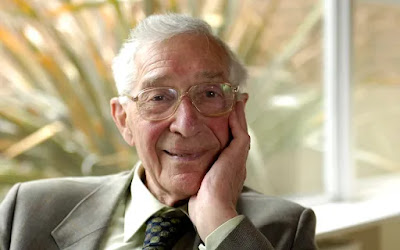 |
| Michael Loewe: The Code-Breaking Scholar Who Bridged War and History |
When you think of extraordinary
multitaskers, Michael Loewe’s life feels like something out of an intricate spy
novel. His journey is a masterclass in blending intellect and curiosity across
entirely different worlds: cracking Japanese naval codes at Bletchley Park
during World War II and unraveling the mysteries of the Han Dynasty as one of
the world’s foremost scholars. Loewe’s story is one of a brilliant mind that
could not only break through cryptographic puzzles but also bridge millennia to
bring ancient Chinese history to life.
In 1941, with the world embroiled in
chaos, Loewe was just another Classics student at Oxford, engrossed in the
study of ancient languages. But his skill with languages didn’t go unnoticed.
Recruited by the legendary Bletchley Park, he found himself thrust into the
secretive world of wartime code-breaking, focusing on Japanese naval codes that
had baffled many before him. This wasn’t the kind of work that made headlines,
but it was the backbone of military strategy. With every cipher he helped
crack, Loewe and his peers peeled back layers of secrecy, handing the Allies
critical advantages in the Pacific theater. In a world where every second
mattered, his contributions were nothing short of life-saving.
Loewe’s transition from student to
code-breaker might seem straight out of fiction, but it reminds me of a moment
in In Quantum
Shadows. When CIA Spymaster Corey Pearson infiltrates
UC Berkeley, he discovers a quantum algorithm capable of making all current
encryption obsolete. Like Loewe at Bletchley Park, Pearson faces a battlefield
of the mind—a race against time where one breakthrough could shift the balance
of global power. The stakes in both cases couldn’t be higher, with the shadow
of catastrophe looming large.
Even after the war, Loewe continued to
unravel complex codes, shifting his focus to Chinese ciphers during the Cold
War while working at GCHQ, Britain’s intelligence nerve center. His linguistic
expertise became a vital resource during an era when Asia was at the heart of
geopolitical tension. But Loewe wasn’t
content to remain in the shadows of intelligence work forever. Instead, he made
an extraordinary leap, dedicating his life to academia and becoming a
world-renowned authority on the Han Dynasty. His work brought the stories,
governance, and culture of ancient China into sharper focus, showing a deep
commitment to intellectual discovery that mirrored his wartime contributions.
Code-breaking, however, is never a
solitary endeavor. It’s a realm where legends like William Friedman, Elizebeth
Friedman, and Genevieve Grotjan Feinstein also left their mark. They, like
Loewe, dismantled the cryptographic walls that veiled truths and safeguarded
secrets. These individuals remind us that wars are often decided far from the
battlefield, in rooms filled with scribbled notes, buzzing machines, and sharp
minds.
The connection between Loewe’s story and
the present feels all the more striking when you think about how far
cryptography has come. In Quantum
Shadows, the quantum algorithm at the
heart of the thriller is said to be unbreakable, a feat that would have stunned
even the geniuses of Bletchley Park. But just as Loewe proved during the war,
no code is invincible when the brightest minds are at work. What made his story
truly extraordinary wasn’t just his ability to solve puzzles but his insatiable
curiosity. That same passion took him from wartime ciphers to ancient Chinese
texts, proving that a curious mind can unlock both the secrets of the past and
the challenges of the future.
Loewe’s life stands as a reminder of the
quiet brilliance that shapes history. He—and those like him—illuminated paths
others couldn’t see, revealing truths that changed the world. Whether it’s
decoding wartime secrets or navigating the murky world of modern espionage as
in Quantum
Shadows, their legacies show us that the most powerful
weapon is often the human mind.
Robert
Morton, a member of the Association of Former Intelligence Officers (AFIO), is
an accomplished author of the Corey
Pearson- CIA Spymaster Short Story
series. Drawing from real-life intelligence operations, he crafts gripping
tales that pull readers into the high-stakes world of espionage. Each story
offers a thrilling escape—and can be enjoyed in just 20-30 minutes. Perfect for
anyone craving fast-paced spycraft!






No comments:
Post a Comment